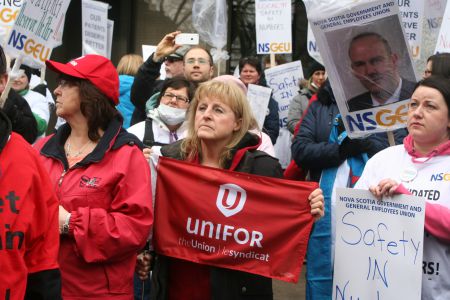K'JIPUKTUK, HALIFAX - The scope of Bill 37, the essential services legislation, is much broader than just the NSGEU Registered Nurses who walked the picket line for that one day in March before the law was proclaimed.
Bill 37 effectively takes away the right to strike from 40,000 unionized health care and Community Services workers province-wide.
The legislation affects hospital staff, people who work in group homes, ambulance dispatchers, and many more. People who do laundry, keep the heat on, prepare the meals.
Which leaves many workers very angry at the Liberal government.
Susan Gill is President of Unifor Local 4600, a Local of roughly 1250 members, all in Cape Breton.
About 550 of them are Licenced Practical Nurses, the people who work shoulder to shoulder with the Registered Nurses. Then there are the people who run the diagnostic imaging labs, the radiation therapists, dieticians, the health care workers who go out into the community, the list goes on.
Gill followed the events leading up to the short-lived nurses strike in Halifax from afar. To see her members included in the essential services legislation was a surprise.
"It came as a shock," Gill tells the Halifax Media Co-op. "I believed the NSGEU would work out a deal. The NSGEU was ready to bargain right to the end. But that didn't happen for them. The government introduced legislation before they had the opportunity to bargain."
"We really pride ourselves on free collective bargaining rights and on our ability to work out deals with the employer. But this Bill takes away every opion that we ever had."
Vernon Martell is on the Executive of Unifor Local 4603. Many Local 4603 members also live and work in Cape Breton. They are mostly hospital service workers, such as power engineers, cooks, housekeepers, and dietary workers.
All members of Martell's Local without exception are affected by Bill 37.
Martell doesn't believe that arguing that a cook is perhaps not as essential as a Registered Nurse is going to fly with this government.
"By all means, [hospital negotiators] are going to want 90 per cent of the workforce as essential services. They are going to try to get to where if we ever went on strike it would be a waste of time," says Martell.
Bill 37 doesn't make any sense, says Gill.
Not only have issues been settled through the bargaining process for as long as Gill can remember, she also doesn't think that continuity in the event of a strike was ever a problem.
She remembers one time several years ago when a strike became a real possibility. The strike never happened, but just in case the union offered to provide workers of each classification.
"What was frustrating is that what we offered was more than the employer was ever willing to deem essential on holidays or weekend," says Gill. "None of that was ever given consideration when they wrote the legislation."
"The public would massacre us [if a life were lost because of a strike]," says Gill.
"And in communities like Cape Breton, that person could be my father, my uncle, my child even. In Cape Breton I would probably know that person. This legislation is so far stretching and so unbelievable and not giving us real credit for the work we do, it is disturbing."
"It may have been the Registered Nurses in Halifax who started the strike, but it could have been us," says Gill.
"Safe patient ratios is something we all support. We support what they are doing."
Martell believes this is only the beginning.
"To me Bill 37 is just the tip of the iceberg in terms of what the government intends to do to bust unions, all unions," says Martell. "That's the bigger picture here."
"I think there is a lot more coming. What Harper is going to miss in the corners the [provincial] Liberals are going to look after," says Martell.
Follow Robert Devet on Twitter @DevetRobert



